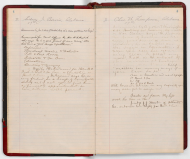Don’t Go Back to Danville: Joe Cannon’s Hidden Trunk
 /tiles/non-collection/1/12-17-NKthompson_cannon_trunk_lto.xml
Image courtesy of National Archives and Records Administration
Democrat Charles Thompson of Alabama recorded a telephone conversation from one of Thompson’s constituents endorsing his request for a new committee assignment: Booker T. Washington of Tuskegee, national African-American leader and Republican figure.
/tiles/non-collection/1/12-17-NKthompson_cannon_trunk_lto.xml
Image courtesy of National Archives and Records Administration
Democrat Charles Thompson of Alabama recorded a telephone conversation from one of Thompson’s constituents endorsing his request for a new committee assignment: Booker T. Washington of Tuskegee, national African-American leader and Republican figure.
Joseph Cannon of Illinois served in Congress for nearly half a century beginning in 1873. He was Speaker of the House from 1903 to 1911. During his Speakership, Cannon ruled the House with an iron fist, and his tenure redefined the office of the Speaker. Historians and political scientists of congressional history have been spilling ink over him ever since. When so much has already been written on a person, even one as significant as Cannon, it’s easy to think that there’s no new ground to cover.
In 1994, offices were created out of storage spaces in the Cannon House Office Building. A staffer for the Committee on Appropriations came across a trunk in one of these spaces that was stenciled with the words “Cannon” and “Danville.” Luckily, this staffer knew his House history (or was tipped off by the name of the building he was standing in) and contacted the Office of the Historian. After some back and forth over ownership of the trunk (the rest of Cannon’s papers had been donated to the Illinois Historical Society, now the Abraham Lincoln Presidential Library), the Clerk of the House granted permission to open the trunk and inspect its contents.
The trunk proved to be an historical treasure chest: numerous letters requesting committee assignments to Speakers David Henderson (1899–1903) and to Cannon, letters congratulating Uncle Joe on his election as Speaker, and five bound books that had a page on every House Member, recording the Member’s name, district, Congresses served, and previous committee assignments. At the turn of the 20th century, before the modern committee assignment process existed, Speakers made committee assignments for all Members of the House.
In the trunk’s volume for the 58th Congress (1903–1905), the entry for Democrat Charles Thompson of Alabama recorded a unique telephone conversation from one of Thompson’s constituents endorsing his request for a new committee assignment: Booker T. Washington of Tuskegee, national African-American leader and Republican figure. Washington nevertheless supported Thompson’s efforts to win assignment to Banking and Currency, Agriculture, or War Claims. Thompson, Washington was recorded as saying, was a “good friend of our institution.” He added, “I hope you can see your way clear to grant any request, both in the interest of our institution at Tuskegee and my race. It will help matters in many ways if you can do so.”
Records like these would have been considered sensitive information at the time, so it makes sense the documents weren’t with the rest of his papers. But they help fill in gaps that illuminated Cannon’s Speakership. All of the records from Cannon’s trunk were recently digitized by the Center for Legislative Archives at the National Archives and Records Administration and are available online to explore in depth. The trunk is on display in the Exhibition Hall of the U.S. Capitol Visitor Center.
Sources: National Archives and Records and Administration Preliminary Inventory for Records of Joe Cannon's Trunk, July 20, 1995; Forrest Maltzman and Eric Lawrence, "Why Did Speaker Henderson Resign? The 799 Mystery is Solved," Public Affairs Report, Vol. 41, No. 4, September 2000.
Categories:
Records & Research, Speakers










